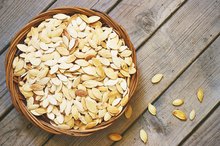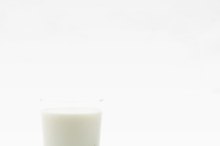What does fact checked mean?
At Healthfully, we strive to deliver objective content that is accurate and up-to-date. Our team periodically reviews articles in order to ensure content quality. The sources cited below consist of evidence from peer-reviewed journals, prominent medical organizations, academic associations, and government data.
The information contained on this site is for informational purposes only, and should not be used as a substitute for the advice of a professional health care provider. Please check with the appropriate physician regarding health questions and concerns. Although we strive to deliver accurate and up-to-date information, no guarantee to that effect is made.
Brussel Sprouts & Hypothyroid
Your thyroid gland produces hormones essential to the normal functioning of metabolism, growth, development, reproductive function and other physiologic processes. Hypothyroidism occurs when the thyroid gland fails to meet the body’s demand for thyroid hormones, causing symptoms in your body that range from uncomfortable to life threatening. Hypothyroidism may develop in people who suffer from autoimmune diseases, take certain medications or undergo cancer treatments, such as chemotherapy and radiation therapy. Eating extremely large amounts of certain vegetables, such as Brussels sprouts can affect thyroid function. Therefore, people with already impaired thyroid function should avoid Brussels sprouts and other cruciferous vegetables 2.
Goitrogens
Brussels sprouts contain several classes of goitrogens, which suppress thyroid hormone production. People with low thyroid hormone production are at risk of thyroid disease, including hypothyroidism 1. Goitrogens can be generated enzymatically from the hydrolysis of some glucosinolates, sulfur-rich plant metabolites, found in Brussels sprouts and other Brassica vegetables. However, many nutritionists believe that these goitrogens are deactivated by processing and cooking.
- Brussels sprouts contain several classes of goitrogens, which suppress thyroid hormone production.
Glucosinolates
Can I Eat Seaweed If I Have Hyperthyroidism?
Learn More
Some species of cruciferous vegetables, including cabbage, broccoli and Brussels sprouts, contain a compound called indole glucosinolates that are metabolized to thiocyanate ions to prevent the uptake of iodine by the thyroid gland. Your body needs iodine to produce thyroid hormones. Thus, people consuming high amounts of Brussels sprouts are at risk of developing iodine-induced hypothyroidism 1. You can easily offset this effect by increasing the amount of iodine in your diet.
- Some species of cruciferous vegetables, including cabbage, broccoli and Brussels sprouts, contain a compound called indole glucosinolates that are metabolized to thiocyanate ions to prevent the uptake of iodine by the thyroid gland.
- Thus, people consuming high amounts of Brussels sprouts are at risk of developing iodine-induced hypothyroidism 1.
Case Report
There is a published case report of hypothyroidism with bok choy -- a Chinese cabbage 1. A 88 –year-old woman developed hypothyroidism and coma upon consuming 1.0 to 1.5 kg of raw bok choy daily for a few months 1.
Refuting Evidence
Side Effects of Phytolacca Berry
Learn More
In a study, eating 150 g, or 5 oz, of cooked Brussels sprouts each day for four months did not affect thyroid function.
Related Articles
References
- University of Maryland Medical Center: Hypothyroidism
- Oregon State University; Linus Pauling Institute: Cruciferous Vegetables; Jane Higdon
- InformedHealth.org. Underactive thyroid: Overview. Updated August 10, 2017.
- Segni M. Disorders of the Thyroid Gland in Infancy, Childhood and Adolescence. In: Feingold KR, Anawalt B, Boyce A, et al., editors. Endotext. Updated March 18, 2017.
- Almandoz JP, Gharib H. Hypothyroidism: etiology, diagnosis, and management. Med Clin North Am. 2012;96(2):203-21. doi:10.1016/j.mcna.2012.01.005
- Biondi B, Wartofsky L. Combination treatment with T4 and T3: toward personalized replacement therapy in hypothyroidism?. J Clin Endocrinol Metab. 2012;97(7):2256-71. doi:10.1210/jc.2011-3399
- Hennessey JV, Espaillat R. Current evidence for the treatment of hypothyroidism with levothyroxine/levotriiodothyronine combination therapy versus levothyroxine monotherapy. Int J Clin Pract. 2018;72(2):e13062. doi:10.1111/ijcp.13062
- Jonklaas J, Bianco AC, Bauer AJ, et al. Guidelines for the treatment of hypothyroidism: prepared by the american thyroid association task force on thyroid hormone replacement. Thyroid. 2014;24(12):1670–1751. doi:10.1089/thy.2014.0028
- Garber J et. al. Clinical Practice Guidelines for Hypothyroidism in Adults: Cosponsored by the American Association of Clinical Endocrinologists and the American Thyroid Association. Endocr Pract. 2012 Nov-Dec;18(6):988-1028.
- American Thyroid Association. (n.d.). Hypothyroidism (Underactive).
- Braverman, L, Cooper D. Werner & Ingbar's The Thyroid, 10th Edition. WLL/Wolters Kluwer; 2012.
- Surks MI. (2017). Clinical manifestations of hypothyroidism. Ross DS, ed. UpToDate. Waltham, MA: UpToDate Inc.
- Sworczak K, Wisniewski P. The role of vitamins in the prevention and treatment of thyroid disorders. Endokrynol Pol. 2011;62(4):340-44.
Writer Bio
Henry Pitot has been writing since 1992. His work has appeared in leading peer-reviewed journals, including "The Lancet" and Cancer Research Online. He is certified in oncology and hematology by the American Board of Internal Medicine. He received his Doctor of Medicine from University of Wisconsin in 1986.








